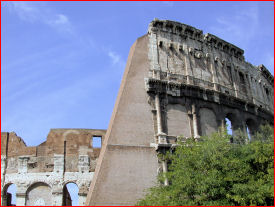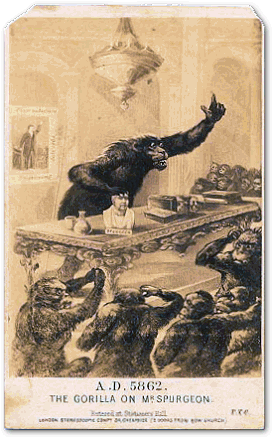Your weekly dose of Spurgeon
The PyroManiacs devote space at the beginning of each week to highlights from The Spurgeon Archive.
The following excerpt, from the January 1874 issue of The Sword and the Trowel, is Spurgeon's description of the second most famous stairway in Rome (after the Spanish Steps).
The lengthy quotation below is borrowed from a history of the Reformation that was popular in Spurgeon's time. Unfortunately, the author conflates two stories. Luther's discovery of justification by faith (which occurred when he pondered the meaning of "The just shall live by faith") actually occurred at Wartburg castle. Luther's own description of that experience (often called the "Tower experience") is quoted in part below, from Luther's Table Talk. The incident on the Scala Santa indeed occurred during Luther's famous visit to Rome, but Luther simply stood in disgust and walked away. The Tower Experience, marking Luther's actual evangelical awakening, came sometime later.
Nontheless, Spurgeon makes some poignant points, worth reading again:
Scala Santa
Perhaps Luther would never have become a Reformer had it not been for his visit to Rome and his ascent of these very stairs.
In the city where he expected to find the church of God in all its holiness, he found sin rampant beyond all precedent. "It is almost incredible," says he, "what infamous actions are committed at Rome; one would require to see it and hear it in order to believe it. It is an ordinary saying that if there is a hell, Rome is built upon it. It is an abyss from whence all sins proceed."
Nor did he speak as an exaggerating enthusiast, for Machiavelli's witness was that the nearer you came to the capital of Christendom the less you found of the Christian spirit. "We Italians," said the great historian, "are chiefly indebted to the church and the priests for our having become a set of profane scoundrels."
Undeceived as to the holiness of Popedom by his own actual observation in its chief city, Luther was in a fit state to be delivered from its thralldom, and the hand which set him free snapped his fetters for him upon the very stairs which we have described, and which [are depicted in the photo above].
[A] historian of the Reformation thus describes the sudden enlightenment of Luther's mind:—
"One day, among others, wishing to gain an indulgence which the Pope had promised to every one who should on his knees climb up what is called Pilate's Stair, the Saxon monk was humbly crawling up the steps, which he was told had been miraculously transported to Rome from Jerusalem.
But while he was engaged in this meritorious act, he thought he beard a voice of thunder which cried at the bottom of his heart, as at Wittenberg and Bologna, 'The just shall live by faith.' These words, which had already on two different occasions struck him like the voice of an angel of God, resounded loudly and incessantly within him. He rises up in amazement from the steps along which he was dragging his body. Horrified at himself, and ashamed to see how far superstition has abased him, he flies far from the scene of his folly.
"In regard to this mighty word there is something mysterious in the life of Luther. It proved a creating word both for the Reformer and for the Reformation. It was by it that God then said, 'Let light be, and light was.' It is often necessary that a truth, in order to produce its due effect on the mind, should be repeatedly presented to it.
Luther had carefully studied the Epistle to the Romans, and yet, though justification by faith is there taught, he had never seen it so clearly. Now he comprehended the righteousness which alone can stand in the presence of God; now he received from God himself, by the hand of Christ, that obedience which he freely imputes to the sinner as soon as he humbly turns his eye to the God-Man who was crucified. This is the decisive period in the internal life of Luther.
The faith which saved him from the terrors of death became the soul of his theology, his fortress in all dangers, the stamina of his discourse, the stimulant of his love, the foundation of his peace, the spur of his labors, his consolation in life and in death.
"But this great doctrine of a salvation which emanates from God and not from man, was not only the power of God to save the soul of Luther, it also became the power of God to reform the Church; a powerful weapon which the apostles wielded, a weapon too long neglected, but at length brought forth in its primitive luster from the arsenal of the mighty God.
At the moment when Luther stood up in Rome, all moved, and thrilling with the words which Paul had addressed fifteen centuries before to the inhabitants of this metropolis, truth, till then a fettered captive within the church, rose up also, never again to fall.
"Here we must let Luther speak for himself. 'Although I was a holy and irreproachable monk, my conscience was full of trouble and anguish. I could not bear the words, 'Justice of God.' I loved not the just and holy God who punishes sinners. I was filled with secret rage against him, and hated him, because, not satisfied with terrifying his miserable creatures, already lost by original sin, with his law and the miseries of life, he still further increased our torment by the gospel. . . . But when, by the Spirit of God, I comprehended these words; when I learned how the sinner's justification proceeds from the pure mercy of the Lord by means of faith, then I felt myself revived like a new man, and entered at open doors into the very paradise of God.
From that time, also, I beheld the precious sacred volume with new eyes. I went over all the Bible, and collected a great number of passages which taught me what the work of God was. And as I had previously, with all my heart, hated the words, 'Justice of God,' so from that time I began to esteem and love them, as words most sweet and most consoling. In truth, these words were to me the true gate of paradise.'"
As the Scala Santa thus became the place of salvation to the great reformer, so may our reference to them be made serviceable to those of our readers who have not yet found peace with God. The motive which leads men to crawl upon their knees up these famous stairs is the worldwide principle of self-salvation. Do is the popular gospel of unregenerate human nature: It is all done is the glad tidings of the grace of God.
You, dear reader, are perhaps trying to be better in act, better in feeling, better in resolution, and this with the view of commending yourself to the favor of God. What is this but your Pilate's Stairs? You will find that all your efforts are labor in vain, for by the works of the law no man will ever be justified before God. The gospel does not promise eternal life to good works, or prayers, or tears, or horrible feelings; its one great utterance is, "He that believeth and is baptized shall be saved." May the Holy Spirit with divine power force upon every self-righteous mind the conviction of its own ruin, and of the hopelessness of its own efforts, and so may the soul become willing to accept eternal life as the gift of God by Jesus Christ.

 I'm in Rome this weekend, preaching in one of the few thriving evangelical churches in this city.
I'm in Rome this weekend, preaching in one of the few thriving evangelical churches in this city.Spurgeon once spent a Sunday here, too, and today things are not all that different from what he described on that occasion.
I don't have time for more than this brief update. See you later in the week.

Special addendum by request:












5 comments:
First the weekly Spurgeon archives appeared on Mondays.
Then it snuck in on late Sundays.
Today is Saturday.
Phil, did you cross the International Date Line backwards . . . twice?
Great post of C. H.'s thoughts on Luther. Very nice.
I remember when the Lord brought me to Himself, and changed my heart, how I felt I needed to make up for all those years I didn't attend church on Sunday. I figured if I went to Mass each and every morning for a year or so, this would catch me up, and help make things right. God was very merciful, and opened my understanding to the truth of justification by faith alone. And I left the Catholic Church, and began my journey in the Protestant realm, which has brought me to the Reformed doctrines, and I am forever grateful to Him.I praise and thank Him every day for that.
WOW! Praise the Lord! What a post! Phil you are truely awesome. We have some really good hitters here on this blog, but I must say, you stepped up to the plate in the DH and blasted a 3-2 pitch GRAND SLAM in the bottom of the 9th for the Win. Holy Toledo!
Phil, how about some history on the sketch of the gorilla and Mr. Spurgeon? What is that all about?
From W.Y. Fullerton's bio of Spurgeon, chapter 6:
[After SPurgeon's first-ever lecture at Exeter Hall,] two later lectures aroused wide attention. Paul du Chaillu had recently published his Explorations and Adventures in Equatorial Africa, and his statements had been received with some caution, especially his account of the gorilla. His discoveries were afterwards confirmed, but Spurgeon believed in him from the beginning, and with Nineveh Layard in the chair, and du Chaillu at his side, he lectured to a crowd that filled the tabernacle to excess. For some occult reason this aroused the fury of the press. More cartoons appeared. One representing Spurgeon as "Greatheart" among a crowd of gorillas; another, "A Gorilla Lecturing on Mr. Spurgeon," with his hand on the head of a bust of the preacher.
The picture I posted is a scan I ripped off from eBay, when someone was seeling a copy of this card.
Greetings from Rimini, on the Adriatic coast of Italy. I'm taking it easy today. The weather is beautiful and the view is spectacular. I'll be home Friday, Lord willing. Don't expect any more posts or comments from me in the meantime. Not only will I be out and walking in the sun, but the Internet access here is outrageous: €12 per hour. I have neither the time nor the budget for that.
Seems to me like the other Pyros are doing fine without my help anyway. Darlene sends her greetings, too.
Post a Comment